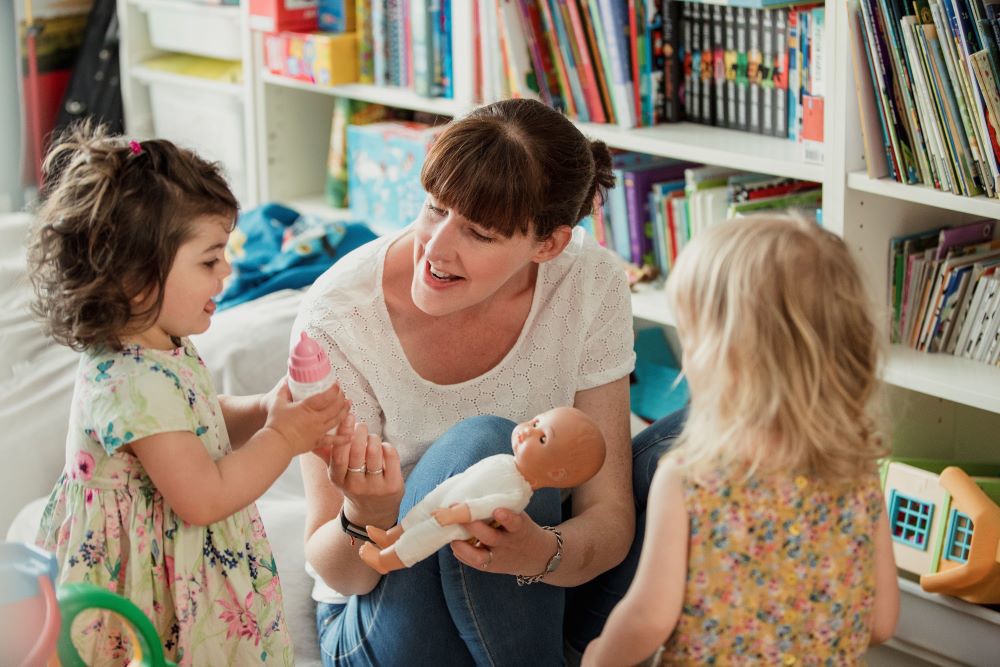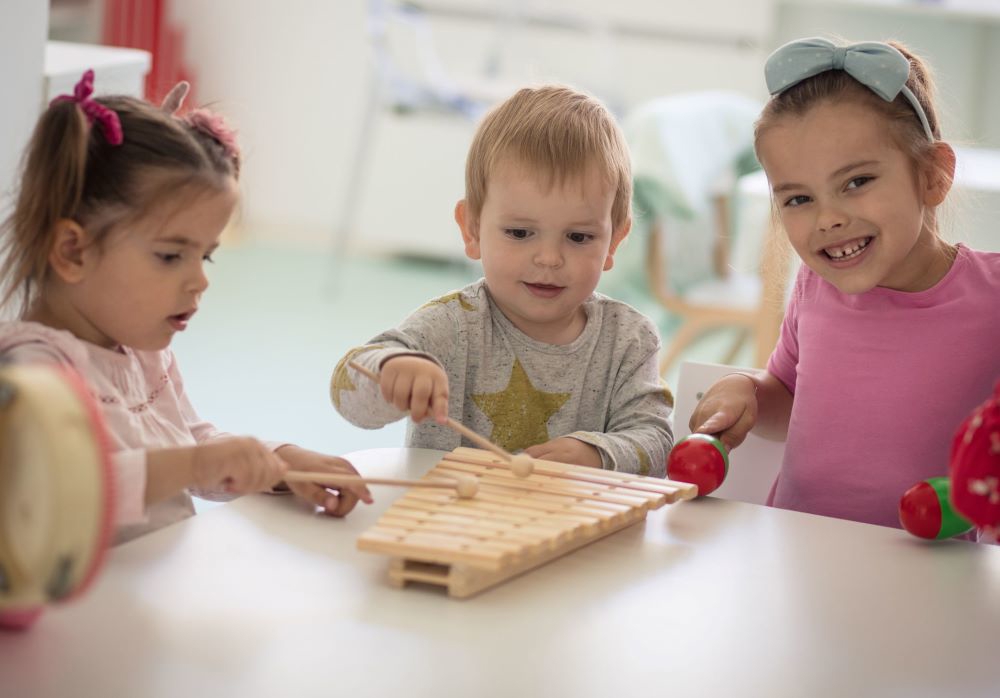Barnsley Early Start and Family Services
Childminding
Are you thinking about a career working as a childminder? It’s a challenging but truly rewarding and varied job. No two days are the same, and you're sure to change a life.
As a childminder, you'll play a vital role in a child’s life. You'll inspire, teach and care for them, and you'll help them to flourish and grow.
More and more parents are looking for good quality childcare. They need care that meets the needs of their busy lifestyles and differing work patterns.
If you're interested in helping families in Barnsley, find out whether this rewarding career is for you. Contact the team by emailing newchildminderenquiries@barnsley.gov.uk or calling 0800 034 5340.
Is childminding for you?
Childminders are self employed individuals registered to provide childcare from either domestic (your home) or non-domestic (church halls, school classrooms etc) premises. If you become a childminder, you must register with either Ofsted or a recognised childminder agency. Once registered, childminders in England must comply with the requirements of the early years foundation stage (EYFS). This is for children from birth to age five and is the statutory framework. If they care for children aged five or older they must also be registered on and comply with the requirements of the childcare register.
To help you decide whether this rewarding career is right for you, our childcare quality improvement team offers one-to-one support and advice.
The team has many years of experience in childcare. They can give guidance and answer any questions you might have to help you better understand this role.
Contact the team by emailing newchildminderenquiries@barnsley.gov.uk or calling 0800 034 5340.
Benefits of being a childminder
- Feeling fulfilled in a job that has a positive impact on children.
- Working for yourself alongside meeting the needs of your family commitments.
- You can set your own working hours and within statutory ratios decide how many children you look after.
- Being your own boss and setting your own rates of pay.
- Gaining professional status with the chance to complete qualifications and grow skills.
- Maintaining a sustainable career through the offer of funded free early years education places, which keeps demand for childcare high.
- Not having to commute to work and being able to take care of your own children as part of your role.
A childminding role is truly flexible to your wants and needs. It means you can manage working life alongside family life.
Step by Step Childminder process
Step 1: Contact us to tell us you're interested in becoming a childminder
Contact the team by emailing newchildminderenquiries@barnsley.gov.uk or call Family Information Service on 0800 0345 340. You'll be emailed an information briefing to allow you to make an informed decision as to whether you want to pursue childminding.
Please see frequently asked questions on the website, or don't hesitate to contact us direct on the above email address if you have any further questions.
A childcare quality improvement officer will contact you to clarify if you do plan to go ahead with your Ofsted registration. They'll then arrange a date for the first support meeting.
Throughout this 10-step process we are there to support and advise you. We're only a phone call away!
Step 2: Apply for DBS’s and place them on the update service when received
If you’re a childminder looking after children at home, then any adults who live with you or work there regularly during childcare hours will also need a DBS check. This could include your partner, cleaner, housemates, lodgers and children over the age of 16. Find out more about people connected with Ofsted-registered childcare.
Step 3: Apply for paediatric first aid training (if needed)
To compete the Ofsted application, you must hold a valid paediatric first aid certificate. If you don't hold a certificate, or your previous certificate has expired, then please book your Paediatric First aid training though the POD system.
Step 4: Complete health declaration form
Before applying to Ofsted, you'll need to complete a health declaration form alongside your GP. Please enquire with your GP as to the fee they may charge.
Download the declaration form.
Step 5: Ofsted application
At this point depending on your childcare experience, you may wish to complete the Ofsted registration application. If you're confident in meeting the requirements of the Early Years Foundation Stage Framework then you can proceed with your application. If not, you need to complete step 6 first.
Registration should take around 12 weeks after submitting all your documentation for verification to Ofsted. This is while Ofsted undertake their suitability checks.
Step 6: Early Years Foundation Stage Framework training
Working alongside your childcare quality improvement officer you'll undertake training. This will support you to be able to meet the requirements of the Early Years Foundation Stage Framework. This will include basic early years safeguarding training, understanding of the educational programme (EYFS) and support with creating your policies and procedures. Return to step 5 and complete the Ofsted application when confident in all areas of EYFS.
Step 7: Complete a childminding portfolio including creation of required policies
To make sure everyone is prepared for their Ofsted inspection, we require the completion of a childminder portfolio. This is to make sure that all the required policies and procedures are in place and fully compliant. It also makes sure the candidate is fully prepared for the Ofsted registration visit.
Step 8: Complete local authority Ofsted preparation visit
Once you have a date for your Ofsted registration visit you'll be visited by a Childcare Quality Improvement Officer. They will support you in preparing for your Ofsted visit.
Step 9: complete Ofsted registration visit
Once Ofsted have completed all their suitability checks, they'll contact you to arrange a suitable day and time to complete the Ofsted registration visit. This visit will take between two and four hours. More details can be found on the GOV.UK website.
Step 10: Next steps once registered as a childminder
You'll need to:
- Activate annual Public Liability Insurance. This needs to be put in place prior to accepting any children (Costs differ depending on insurance company used)
- register with the Information Commissioners Office (cost £40 annually)
- create your personal entry on the Virtual Family Hub. This promotes your business as a childminder within Barnsley. An information officer will be in contact with you to discuss your childminding information. They'll also arrange for your information to be uploaded on to the system.
- Register with HMRC as self-employed and set up accounting procedures. You can speak to the Launchpad team within Enterprising Barnsley for more information about becoming self-employed and promoting your business.
- Market your business
- Undertake continuous professional development including signing up to relevant professional information websites (Ofsted, foundation years, BMBC newsletters etc.)
- Begin your new career as a childminder
Financial support for becoming a registered childminder
To become a register childminder there are a number of cost factors that you'll incur. These include DBS applications, heath declarations, Ofsted application fees and training courses to enable you to register. Please speak with a member of our team for current costings. You can email newchildminderenquiries@barnsley.gov.uk.
The government are currently offering a childminder start up grant to support with the set up costs of registering your business with either Ofsted or a childminder agency.
This grant is currently available for anyone completing their registration before 31 March 2025.
The government grant will be paid directly to the newly registered childminder upon completion of the registration process and subsequent Ofsted or agency approval.
Find out more about the childminder start-up grant.
What happens when you register?
- Register to become a childminder on the GOV.UK website.
- An Ofsted inspector will visit your home to check whether it's suitable, safe, and ready to take children. When you receive your Ofsted registration certificate your childminding career can start.
- You'll now be able to choose when and what time you'll offer your sessions. You'll need to offer flexible hours that parents using your service will be looking for. you'll need to come to an agreement that suits their needs.
- You can also set your own charges and fees for your service and receive payment directly from parents. We can give you an idea of the average prices that childminders may charge for the area.
Visit the GOV.UK website for full details of how to register as a childminder.
Frequently asked questions
Can I be a childminder if I live in rented accommodation?
Yes, with the landlord’s permission.
I don’t have a big house with a playroom, can I still be registered as a childminder?
Yes, you don’t need to have a big house and/or garden to become a childminder. However, there are some requirements regarding space per number of children. See Early Years Foundation Stage Framework (EYFS).
What is the minimum age to become a childminder?
18 years old.
Can I be a childminder if I am a single parent?
Yes, and you may still qualify for additional benefits.
How long will it take me to register to become a childminder?
Once you're in a position to apply with Ofsted as a childminder your application will take around 12 weeks.
Could I be a childminder if I have pets?
Yes. You'll need to make sure you support children to understand how to be around pets. You may wish to implement a pet policy to share with parents/carers.
Can I be a childminder if I don’t drive?
Yes, a childminder can use the local community around them as well as using public transport to venture further afield.
Can I be a childminder if I don’t have children of my own or they're grown up and have left home?
Yes, part of the training to become a childminder will help you to understand child development. It will also prepare you to support children to learn and show how to keep them safe.
Do I have to have a level 3 qualification in childcare to become a childminder?
No formal qualifications are needed to become a childminder. You'll need to show that you can follow the safeguarding and welfare requirements and the learning and development requirements of the Early Years Foundation Stage Framework (EYFS). These will be checked at your Ofsted registration visit.
What's the difference between a childminder and a nanny?
A childminder is a self-employed small business person who works from their own home or from non-domestic premises with children from different families. A nanny is a person who is employed to care for a child in their own home.
Can I claim education funding for my own or a relatives child when I'm Ofsted registered?
No, a childminder may not claim funding to care for a child who is related to them. The definition of 'relative' in relation to a child means a grandparent, aunt, uncle, brother or sister. These can be of full blood or half blood or by marriage or civil partnership.
As a childminder do I have to follow any educational frameworks?
As a childminder you'll play a key role in delivering the Early Years Foundation Stage Framework for childminders. The EYFS framework sets the standards for the learning, development and care of children from birth to the end of the foundation stage. This is 31 August after their 5th birthday.
As a childminder what ages of children can I look after?
A childminder’s registration allows them to look after children from birth to age eight,. However, they can look after older children should they want to.
What hours can I expect to work as a childminder?
As a childminder you're self-employed, so set your own hours. Childminders can provide very flexible childcare, with many offering more flexible hours to include early mornings, evenings, weekends and overnight. You can decide which hours best suit you and your family.
How many children can I care for as a childminder?
At any one time, childminders (whether providing the childminding on domestic or non-domestic premises) may care for a maximum of six children under the age of 18. This includes the childminder’s own children and any other children for whom they're responsible, such as those being fostered. Of these six children, a maximum of three may be young children (ie. a child is a young child until 1st September following his or her fifth birthday). There should only be one child under the age of one.
I have a question that has not been answered above, what should I do?
Please email newchildminderenquiries@barnsley.gov.uk and one of our advisers will get back to you.
Where you can work
Working in a nursery
Nursery workers help babies and children up to five years old to grow and learn in a safe and supportive setting.
Find out more about working in a nursery on the National Careers Service website.
You can also find information on the GOV.UK website.
You can contact our team by emailing earlyyearsandchildcarecareersenquiries@barnsley.gov.uk. You can also call 0800 034 5340.
Working in an out of school club
Playworkers help children and young people to build their physical, social and language skills through play.
You can get into this job through:
- a college course
- an apprenticeship
- volunteering
- applying directly
Contact the team by emailing earlyyearsandchildcarecareersenquiries@barnsley.gov.uk or calling 0800 034 5340.
You can find out more about out of school clubs on the GOV.UK website.
Working in a family hub
There are several roles working with children and families in a Family Hub including:
- Early Years Practitioner
- Engagement Officer
- Targeted Early Help Practitioner
- Assistant Family Hub Manager
- Family Hub Manager
Find out more on our family hubs webpage.
Training and development
Apprenticeships
Early years professionals are crucial in helping children develop before starting school. They plan and run education, play activities with children under five years old, and make sure they're safe and happy. It's a joyful and rewarding job where apprentices will get to see children learn and grow thanks to their support.
There are two entry-level early years apprenticeships:
- level 2 early years practitioner
- level 3 early years educator
Both are suitable for those with no previous experience.
Visit the government's apprenticeship webpage to find out more.
If you're an employer looking for more information about taking on an apprentice please find out how to take on an apprentice.
Finding courses
You can find local training providers on our training and continuous professional development webpage.
You can also find courses on the GOV.UK website.
Finding jobs
You can get help with your application and find jobs on the GOV.UK website.
Stories from early years and childcare workers
You can find stories from people working in childcare to find out if its right for you.
For more information
Contact us online or call us on 0800 034 5340
How we can help you
We're on hand to support you with your new career, we can offer:
- advice and support in your role
- support for Ofsted readiness
- free training and occasional grants
- career development opportunities
- quality improvement programme support
- free advertising through the Barnsley Virtual Family Hub
You may want to know about...
- Childcare business support
- Funding and early years entitlements
- Health and safety for early years professionals
- Leadership and management in EYFS
- Learning and development in EYFS
- Ofsted
- Starting up as a childminder or childcare business
- Statutory assessments for EYFS
- Supporting inclusion in Early Years
- Training and CPD for early years professionals
- Useful early years information and documents
- Working with parents in the EYFS



